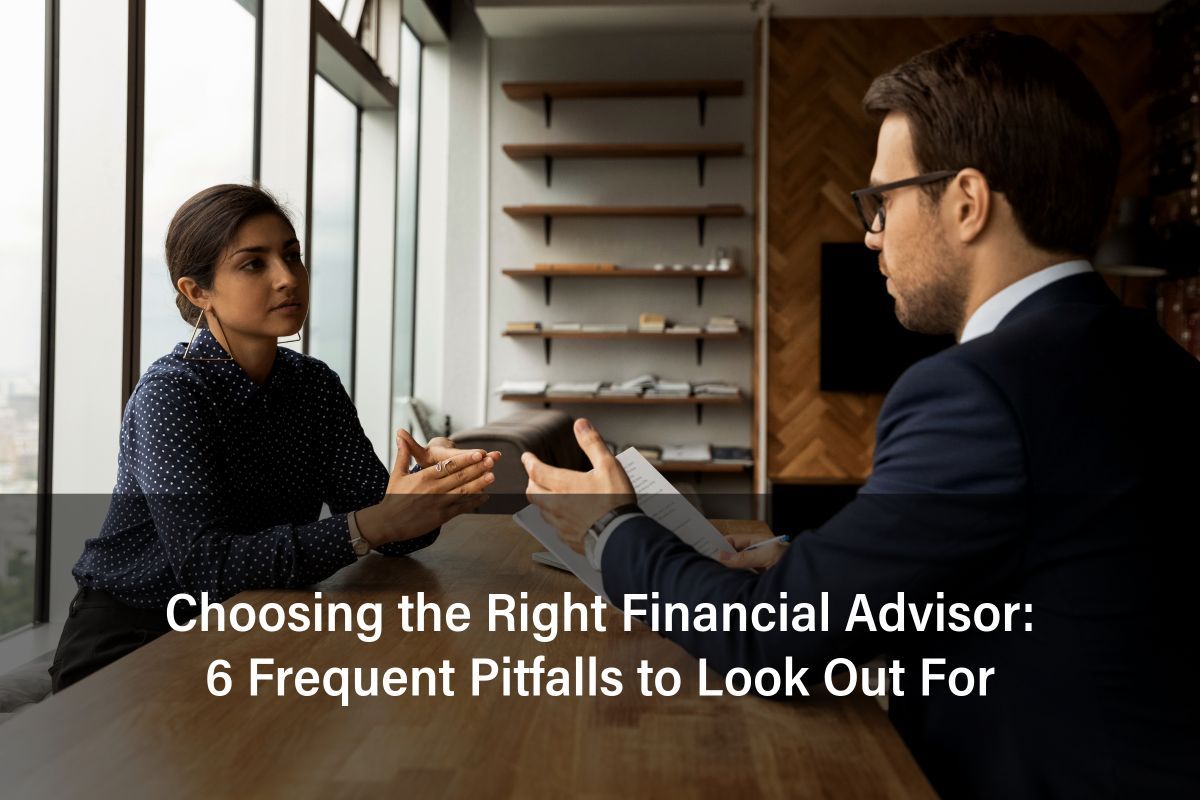Choosing the Right Financial Advisor: 6 Frequent Pitfalls to Look Out For

Choosing the right financial advisor is one of the most important decisions you’ll make in your financial journey. The right advisor can help you build wealth, plan for the future, and help achieve your financial goals with confidence. However, selecting the wrong one can lead to costly mistakes and mismanagement of your hard-earned money. In this blog, we’ll explore some of the most common mistakes people make when choosing a financial advisor and offer tips to help you avoid these pitfalls, helping you make a decision that aligns with your financial aspirations.
#1: Settling for the First Financial Advisor You Meet
It’s important to be thoughtful and intentional about the person you choose to help you build and grow your wealth. Sure, the financial advisor down the street may be convenient, but are they truly the best advisor for you? It’s tempting to hire the first financial professional you find so you can cross this decision off your to-do list, but it requires more than cursory consideration. It’s best to meet with at least three advisors before choosing. This allows you to compare and contrast, ask questions, and get a feel for the client experience each offers.
#2: Not Choosing a Fiduciary Financial Advisor
Not all financial advisors are created equal. There are varying professional standards which advisors must legally meet, and the fiduciary standard is the strictest. A fiduciary financial advisor has a legal obligation to act in a client’s best interest. This creates a unique bond of trust and means you won’t have to worry about conflicts of interest as your advisor builds your wealth management and investment strategies. It also means that your advisor will never recommend a financial product for which they are paid a commission – something which you should be wary of if you choose to work with a financial advisor who is not a fiduciary.
SEE ALSO: Planning for the Future Together: Retirement Savings Tips for Couples
#3: Overlooking Credentials and Qualifications
The advice you get – and follow – from your financial advisor can have life-changing consequences. This is why it’s imperative you ask potential advisors about their credentials. Ask which tests they have passed, which licenses they have been awarded, and which credentials they have earned. Have they passed the Series 7? What about the Series 65 or Series 66? Some financial advisors take their education and credentials a step further, becoming a CFP® (Certified Financial Planner). Don’t just take their word for it – you can verify CFP® credentials here.
#4: Misinterpreting Financial Advisor Fee Structures
Be sure you take the time to understand a financial advisor’s fee structure, as they can vary. Some are fee-only, while others take a percentage of all your assets under management. Some advisors earn a commission directly from financial products or mutual funds, and this represents a significant conflict of interest. Remember, fees will impact your overall nest egg and you should have clarity on exactly how your advisor gets paid.
#5: Picking an Advisor with a Mismatched Strategy
You will likely be relying on your financial advisor’s advice and strategy with regard to your investment portfolio. It’s critical that the advisor’s strategy aligns with your needs and preferences. For instance, risk tolerance is an important component in your strategy and it is unique to each individual. If you prefer to tip your portfolio toward more secure investments like bonds, but a potential financial advisor favors an aggressive stock approach, you should seek guidance elsewhere. Your financial advisor should be willing to strategize around your needs and preferences.
SEE ALSO: Investor Tips: 9 Strategies that May Strengthen Your Investment Portfolio
#6: Disregarding Your Instincts
Maybe you’ve met with a financial advisor who holds the highest certifications, has many years of experience, and seems highly knowledgeable, too. On paper, they appear to be the best choice. However, be sure to do a gut-check, too. Did the advisor answer your questions fully and with patience? Did you feel heard when discussing your goals and needs? Did your gut tell you they were trustworthy? If you have nagging doubts about a potential financial advisor – even if you can’t quite put your finger on why – keep looking for someone else. You should feel completely confident in the person handling your money, so follow your gut.
Choosing The Right Financial Advisor for You
At Paces Ferry, we are fiduciary financial advisors focused on the highest level of client service. We practice transparency and full disclosure and believe in the importance of fostering two-way communication. We are here for our clients through every phase of their financial lives – to identify and set goals, create an operational plan, and provide guidance and support along the way.
If you’d like to learn more about our services and philosophy, please schedule a call with us today. We look forward to hearing from you!